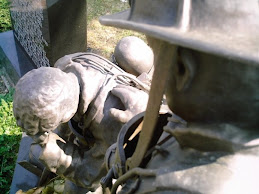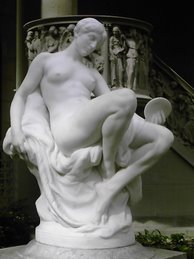By Joseph Kellard
Earlier this decade, when my nephew attended Oceanside Middle School, his teachers devoted a month to the Holocaust. He and his fellow eight-graders had to read a book, watch a movie and write several reports on this important subject.
As students nationwide are taught the horrors of Nazism, however, I won’t hold my breath waiting for those same educators to teach anything comparable about the grand-scale horrors of an equally evil ideology: communism.
I’m reminded of this as the 20th anniversary of the Berlin Wall’s fall approaches on Nov. 9. While growing up during the Cold War era, I’d seen many movies and documentaries and read books, both in and outside of Oceanside schools, about Hitler’s atrocities. Why then did it take me until my late-20s to finally discover the collective horrors committed by Communist dictators — an estimated 100 million people perished under Marxist regimes, and countless others suffered widespread poverty and deprivations?
I initially discovered communism’s legacy on my own by reading Russian authors Ayn Rand and Alexander Solzhenitsyn, who both survived the Soviet slave state. More recently, I completed “The Black Book of Communism,” the most comprehensive tome on Marxist utopias, whose ever-present political imprisonments, tortures and executions continue today, and “Gulag,” by Anne Applebaum, an equally thorough study of the Soviet forced-labor camp system.
I've since learned that in Soviet Russia the mass murders began immediately under Vladimir Lenin and peaked with Joseph Stalin, who from 1932 to 1933 systematically starved an estimated 6 to 10 million peasants in Ukraine after they rebelled against his collectivized farm system. Under the reds, tens of millions of people were deported to gulags, many in frigid Siberia, where most perished.
Mao Tse-tung can unquestionably be called history's worst mass murderer, having orchestrated a massive famine from 1959 to 1961 that killed between 20 and 43 million Chinese, and overall the communist dictator slaughtered some 65 million people.
During Pol Pot's Khmer Rouge regime in Cambodia from 1975 to 1979, a third of that nation's citizens were sacrificed in what is the greatest proportion of a population exterminated under a communist dictatorship.
It is disgraceful that educators never teach, give short shrift to, or rationalize away the horrors in these and other nations that instituted communism or still do, as in North Korea and Cuba. Yet a fundamental and complete understanding of both Nazism and communism requires that they are taught together — they represent two sides of the same ideological coin.
As with the Holocaust, the horrors of communism have their deniers and apologists. The difference is the Nazi sympathizers are properly condemned and shunned, but some gulag deniers still hold high positions in our universities. These professors and their former students in education, the mainstream media and government still preach that communism is noble in theory but failed in practice. In reality, communism, like Nazism, failed miserably in practice because it is anti-life in theory.
At root, both preach that the individual must sacrifice for the group and state, be it “the master race” under an Aryan regime or “the working class” under a dictatorship of the proletariat; that the individual has no right to his life, liberty, property or the pursuit of his own happiness; that he must obey the dictates of the state; and that its use of physical force is a justifiable means to effect these ends.
The most important lesson students can learn about totalitarian regimes is that both ideologies lead to the systematic violation of individual rights, the moral-political principle that is America’s original foundation, and ultimately had to lead to mass deaths.
But how can students learn such lessons when communism and its history are virtually ignored, its ideology is still taught as noble, and some openly celebrate communist killers such as Mao and Che Guevara?
For starters, educators can assign their students novels like Ayn Rand’s “We The Living,” to introduce them to Marxist ideals and the perpetual hopelessness and fear people suffer living under a communist state, and Solzehenitsyn’s “One Day in the Life of Ivan Denisovich,” which revealed the brutality of the Soviet labor camps.
We cannot expect the horrors of history's bloodiest regimes to never happen again if our educators fail to teach students about the corrupt ideas that made them happen.
Thursday, November 5, 2009
Subscribe to:
Post Comments (Atom)































+-+June+2009.jpg)











9 comments:
Great piece and very timely
Thanks for your reply, Joel. Agreed.
Joseph, thanks for the article. It certainly has been my experience that I hear frequently about the holocaust and the evils perpetrated by Nazi Germany but hear little of the evils of communism in general, and even have heard it named as a noble ideal.
If your core premise that the educators in general ignore, gloss over or even praise communism is true you rightfully take them to task. However, you cite little evidence to back this point. I believe your argument would be much stronger if you indicated sources for that claim.
Kevin,
Thanks for your reply to my column.
You're right that my argument would be made stronger with some concrete examples of my claims, but I wanted to keep my column as short as possible.
I thought of citing a book that documents the communist apologists in academia, but I can’t recall the title of that book. That would have been one minor but effective concrete example.
~ J.
Teaching people about how bad communism is and how it won't work isn't really enough. Eventually, people are going to want communism or a social system similar to it with a different name.
Communism has been defeated pragmatically in Soviet Union, Kibbutzim of Israel, China, and Vietnam, but not morally. The moral code that gives the rise of communism is still around us. It is altruism. It is in every corner of the street when a politician wants to buy votes by selling hopium. This financial crisis is the best example. Think about it.
EP: I have thought about it, and I agree with you.
I didn't explicitly address morality in my column, but indirectly touched on it when I wrote:
In reality, communism, like Nazism, failed miserably in practice because it is anti-life in theory.
At root, both preach that the individual must sacrifice for the group and state, be it “the master race” under an Aryan regime or “the working class” under a dictatorship of the proletariat; that the individual has no right to his life, liberty, property or the pursuit of his own happiness; that he must obey the dictates of the state; and that its use of physical force is a justifiable means to effect these ends.
The most important lesson students can learn about totalitarian regimes is that both ideologies lead to the systematic violation of individual rights, the moral-political principle that is America’s original foundation, and ultimately had to lead to mass deaths.
I think you got it right. At the root, both preach sacrifice the individual for the group and state. It is synonymous to worshiping of "We", blindly obedience to the main stream, and "Ask not what your country can do for you; ask what you can do for your country."
I am curious as to whether you or anyone else who has such a strong "moral" objection to communism has ever actually studied it. I don't mean by reading books by people like Glenn "Liar-Liar-Pants-on-Fire" Beck. I'm talking about actually reading something written by Karl Marx, Antonio Gramsci, Louis Althusser, etc.
Communism tends to fail not because it is "anti-life" as you put it, but because those who are usually in power in a communist society are not communist. They are opportunists who hold traditional capitalist ideals for themselves. And by convincing their people and and other nations that they are communist, the people work for a government that takes all the money and gives little back to the people.
The real difference between the "communism" of the Soviet Union and the capitalism of the United States is that people didn't understand that they were working for the good of the few who managed to slime their ways to the top. No, wait... That sounds like capitalism, too.
Read the real ideology behind communism and you will know that what I'm saying is true. Given the false meritocracy that exists in the United States today, I'd take communist ideal any day.
ES:
Your comment amounts to: Communism is noble in theory, but it’s the political people who supposedly practiced it who gave it a bad name.
But the reality is, communism does not “tend” to fail, it has outright failed everywhere it has been practiced — precisely because Marxism is so anti-reality and, thus, anti-life.
Yes, I have read Marx. The question is if you have read him, and if so how carefully and philosophically? His books call for initiating force against others and abolishing property. I just flipped through my copy of the Communist Manifesto and can point out several examples I had underlined:
“The proletariat will use its political supremacy to wrest by degrees all capital from the bourgeoisie, to centralize all instruments of production in the hands of the state.”
“Abolition of property in the land and application of all rents of land to public purposes.”
“A heavy progressive or graduated income tax.”
“Centralization of credit in the hands of the state by means of a national bank with state capital and an exclusive monopoly.”
These are just some examples of how the people who practiced communism were doing exactly what Marx and his ilk called for: that is, a dictatorship of the proletariat. So I know what you are saying is not true.
Since you’re under the delusion that there were some pure, well-intentioned Communists who never really got a shot at practicing communism the right way, I would suggest that you read “The Monument Builders” by Ayn Rand, in her book “The Virtue of Selfishness.”
Here’s an excerpt: “Socialism is not a movement of the people. It is a movement of the intellectuals, originated, led and controlled by the intellectuals, carried by them out of their stuffy ivory towers into those bloody fields of practice where they unit with their allies and executors: the thugs.”
Or read Rand’s essay: “Faith and Force: The Destroyers of the Modern World” in her book: “Philosophy: Who Needs It”:
“When you hear the liberals mumble that Russia is not really socialistic, or that it was all Stalin’s fault, or that socialism never had a real chance in England, or that what they advocate is something that’s different somehow—you know that you are hearing the voices of men who haven’t a leg to stand on, men who are reduced to some vague hope that ‘somehow, my gang would have done it better.’
”The secret dread of modern intellectuals, liberals and conservatives alike, the unadmitted terror at the root of their anxiety, which all of their current irrationalities are intended to stave off and to disguise, is the unstated knowledge that Soviet Russia is the full, actual, literal, consistent embodiment of the morality of altruism, that Stalin did not corrupt a noble ideal, that this is the only way altruism has to be or can ever be practiced. If service and self-sacrifice are a moral ideal, and if the ‘selfishness’ of human nature prevents men from leaping into sacrificial furnaces, there is no reason—no reason that a mystic moralist could name—why a dictator should not push them in at the point of bayonets—for their own good, or the good of humanity, or the good of posterity, or the good of the latest bureaucrat’s latest five-year plan. There is no reason that they can name to oppose any atrocity. The value of a man’s life? His right to exist? His right to pursue his own happiness? These are concepts that belong to individualism and capitalism—to the antithesis of the altruist morality.”
http://aynrandlexicon.com/lexicon/soviet_russia.html
Post a Comment